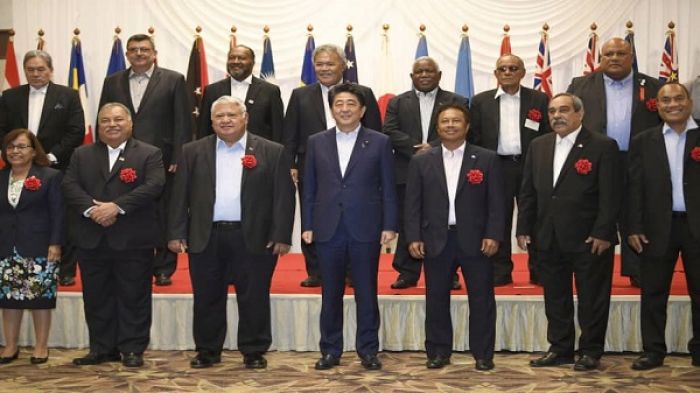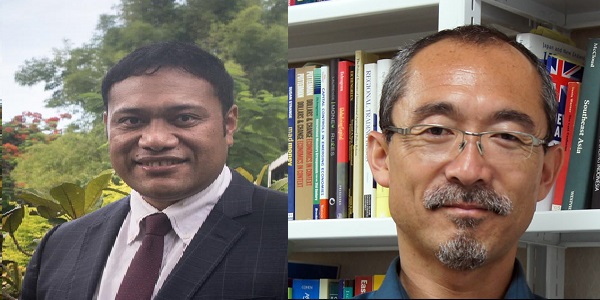Wanted: a strategic dialogue with Pacific island countries Featured
 Prime Minister Shinzo Abe and other leaders pose for a group photograph at the PALM 8 Meeting in Iwaki, Fukushima Prefecture, on May 19. | KYODO
Prime Minister Shinzo Abe and other leaders pose for a group photograph at the PALM 8 Meeting in Iwaki, Fukushima Prefecture, on May 19. | KYODO
Wanted: a strategic dialogue with Pacific island countries
BY KAITU'U 'I PANGAI FUNAKI AND YOICHIRO SATO

BEPPU, OITA PREF. - Can Japan count on the Pacific islands countries (PICs) to support its regional strategy? The short answer is, it is doubtful. The PICs perceive themselves as being in a one-way relationship wherein Japan exists to assist the PICs with their limitations. Trust in the PICs is based on expression of generosity understood as not only what one receives from a relationship, but also on what one gives back to it. Consequently, in its current form the relationship between Japan and the PICs is not structured to engender trust.
Moreover, the PICs have a shared foreign policy of “friends to all and enemy to none,” and supporting Japan may place the PICs in the role of “enemy” to other countries. These limitations notwithstanding, Japan and the PICs must work together to coordinate their approaches to important regional issues, such as how to deal with the rise of China and North Korea’s nuclear weapons development.
PIC perceptions of their relationship with Japan as being unidirectional are long-standing. Japan took the initiative to develop its relationship with the PICs as a group through the establishment of the summit-level Pacific Islands Leaders Meeting (PALM) in 1997.
PALM — whose members include Japan, Australia, Cook Islands, Federated States of Micronesia, Fiji, Kiribati, Republic of Marshall Islands, Nauru, New Zealand, Niue, Palau, Papua New Guinea, Samoa, Solomon Islands, Tonga, Tuvalu and Vanuatu — has come to be considered the main venue for Japan to hold dialogue with leaders of the PICs. However, during these meetings Japan and the PICs both appear unsure of how best to enhance their relationship as partners despite including “we are islanders” in the PALM theme for the past three meetings.
Japan’s propensity for informing the PICs of policies impacting or involving them, rather than co-creating such policies, inhibits the development of trust. For example, Japan did not partner with the PICs during development of its new “Free and Open Indo-Pacific Strategy” (FOIPS), regarding how the PICs could contribute to this strategy. Instead, Japan informed them of their involvement for the first time only two months before PALM 8, at which Japan sought their cooperation with the policy.
During PALM 8, the Japanese government declared FOIPS as the cornerstone of its foreign relations with the PICs in regard to the development of human and non-human infrastructure. This infrastructure was intended to strengthen the capacity of the PICs to keep the oceans and seas of the Indo-Pacific region free and governed by international law.
Nonetheless, despite FOIPS directly referencing the Pacific people as guardians of the ocean through their Pacific Ocean identity, the PIC leaders were insufficiently consulted on what they had to contribute toward being guardians of the Pacific. The process generated an insufficient sense of reciprocity in the relationship between Japan and the PICs. Consequently, PIC leaders evinced doubt regarding Japan’s intentions behind FOIPS as well as the rationale behind the definition of a “Free and Open Pacific.”
Furthermore, the PIC leaders typically sign agreements for the overseas development aid promised to them by Japan before and during PALM. By requesting PIC cooperation with the pre-determined FOIPS at the same time that it issued ODA agreements, Japan created an environment of distrust.
PIC leaders were concerned that their responses regarding FOIPS would potentially impact the value of the ODA projects Japan was prepared to offer them. This disjuncture at the strategic level is all the more regrettable, given the much better reception of Japan’s aid per se among the PICs — a product of coordinated requests by the PICs.
Some aspects of the FOIPS are no doubt aimed at counterbalancing China’s growing influence in the Pacific. It would be a mistake on the part of Japan not to openly communicate this point.
The fact that several PICs are already heavily indebted by China to the point of endangering their autonomy, despite having long-standing partnerships with Japan, is indicative of overly focusing on the coordination of economic interests at the neglect of strategic discussions.
Japan also sought PIC support in enforcing sanctions against North Korea in Paragraph 47 of the PALM 8 declaration. Japan’s push was a direct reaction to the suspected involvement of the North Korean dummy companies registered in Samoa and Marshall Islands in ship-to-ship transferring of illicit cargo at sea and the reflagging of a suspected North Korean ship in Palau, both in order to evade United Nations sanctions.
As members of the international community, the PICs should already be supporting existing sanctions against North Korea. However, they have not yet risen to their responsibility in this regard due first to their lack of expertise and ignorance but also to the strength of their cultural imperative of being an “enemy to none.”
This cultural imperative unfortunately conceals the undercurrent lure of easy money from registering North Korean ships and companies. PIC leaders will require strong motivation to break with established practice; experiencing a sense of reciprocity in their relationship with Japan could serve as such a motivation. The manner in which Japan presented its agenda at PALM 8 with a short notice publicly shamed some PIC leaders and failed to foster a sense of ownership of the agenda among others.
The current form of Japan’s relationship with the PICs does not include reciprocity and thus compromises the PICs’ sense of self-respect. This self-respect can be restored doubly, first through adding reciprocity into the Japanese-PIC relationship, and second through the PICs accepting and acting on their obligations to take a stance and align themselves with other members of the international community.
However, if Japan were to shift to becoming more of an equal partner in its relationship with the PICs and utilize PALM to support the PICs in identifying and rectifying the islands’ own needs, then this approach would lead to the PICs being more open to supporting Japan in its actions in return.
The threat Japan feels from North Korea may not be considered by the PICs to be of direct concern to them. Nevertheless, giving the PICs the option to provide their support to Japan on this and similar issues of major concern would allow them the opportunity to express generosity toward Japan by publicly supporting it on the global stage. Such generosity would reciprocate the support received from Japan, keeping the relationship balanced while fostering unity within the Japanese-PIC relationship. Moreover, the opportunity to reciprocate to Japan will ensure continued dignity for the PICs as they rise to their responsibility and participate in coordinated international actions having value for the global community of nations.
This year, Japan will for the first time host a three-week-long seminar for capacity building against ship-to-ship transferring of illicit cargo, inviting maritime officers from 14 PICs to University of South Pacific in Fiji. Improved PIC capability to secure its sea will hopefully revive the dignity of the “guardians” of the sea.
Kaitu’u ‘i Pangai Funaki, a researcher in Asia-Pacific studies, politics and international relations, is the founder of the Dignified Pacific Initiative. Yoichiro Sato is a professor of Ritsumeikan Asia Pacific University (APU).
3 comments
-

Since we all have a “map” (past conceptual framework) and our interpretations of the “territory” (everyday cultural and natural ecosystems) are unequal, uniting ideas is only possible through listening to others. Paraphrased from Gregory Bateson.
Thank you Dr. Professor Hufanga for the analysis and clarifying how the approaches outlined on the article matches with the Ta-Va philosophy. I look forward to more discussions and further collaborations through workshops or conferences in the future. I believe it would be a great opportunity for our Pacific people to combine efforts, co-create in weaving out transformation patterns that could help redefine our pacific value in order to make a difference globally. Let me state my argument again that the social issues plaguing the PICs are not rooted in what the countries lack, but rather in how Pacific people culturally perceive their own self-worth (dignity/mana) or “ngeia” in Tongan (please correct me if I’m wrong). This self-worth (mentioned a little about this in the article) is impacted by society’s valuing of reciprocity in gift-giving; an individual who fails to reciprocate is considered insignificant and inferior (slave), and therefore loses the spiritual power to function appropriately (obligations) in the society. As we know, humanity cannot thrive without dignity/mana/ngeia.
Thank you bertie for the interesting addition. I strongly believe and argue that solutions to global problems we face today no longer exist in advanced economies and big cities. I argue that these solutions are hidden and well-kept by the elders in our Pacific Island Countries due to the short colonial period... Imagine if every Pacific islander are aware and truly convinced that their existence are already a contribution to the world! Cultural Heritage (more than 1000 languages, dances, art etc), Global security (Oceania covers 1/3 of the earth), Sports (Rugby etc)... many more! How about if we imagine the opposite? that Pacific people are dependent, savages, baggers etc! Whew! The origin on “belittlement” from our very own Prof. Epeli Hau’ofa. Pacific people are Peace loving people and we all know we are. What I have in mind is the vision of “unity in differences” where countries including PICs could engage in harmony with advances economies even when foreign policies are self-interested. This also follows the Ta and Va philosophy: mediated and managed through sustained symmetry, harmony and beauty.
Baggers don’t choose: The original frustrations expressed here are very true. The new problem at the moment is, "Beggars can now choose": situation when many givers are willing to provide similar offer. I strongly argue that dependency (baggers) only exist when there are no rewards/benefits in return from the other party in any relationship. Should we call this a relationship at all? Unfortunately, natural resources, political favors, etc. that are provided by the PICs to traditional ODA donor nations are not perceived as reciprocation for aid provided. Foreign aid follows the concept of “helping you to help yourself” (one way) which leads to something I call "Official Dependency Assistance" (the new ODA). My work hope to rephrase our global development priorities to consider adding the alternatives of “helping you help others.” This shift should allow PICs to own their development through reciprocity (generosity), but not necessarily to the same giver, but rather for the good of all - others (SDGs). PICs have not yet found the right way to contribute back to the world in exchange for the ODA they receive which negatively impacts their perception of their own self-worth. Correlatively, identifying something of value to offer in return would restore the PICs’ sense of self-worth and reduce the ills troubling our societies.
The solution of Gross National Generosity (GNG) is outlined on the link below. I hope to join forces with various individuals in developing the concept further.
Yes, we always do better when we work together.
https://www.dignifiedpacific.com/gross-national-generosity/
Malo ‘aupito e talanga pea ‘ofa ke ‘i ai hano ‘aonga ki hotau fonua ‘ofa’anga pea pehe ki hotau Pasifiki.
Faka’apa’apa atu moe ‘ofa,
K.Funaki -
![Hufanga [Okusitino Mahina]](https://secure.gravatar.com/avatar/3faef0c7fca480e4d3fd4ffffa7a37c4?s=48&default=https%3A%2F%2Fmail.nepituno.to%2F%7Enepituno%2Fcomponents%2Fcom_k2%2Fimages%2Fplaceholder%2Fuser.png)
Malo lahi and many thanks Dr Kaitu'u 'i Panagi Funaki and Professor Yoichiro Sato for their refreshing take on Japan's Pacific Island Countries (PICs) diplomacy, where a strategic dialogue is highly desirable to the point of it being necessarily required, which I found to be both truly enlightening yet exciting and critically thought-provoking. A highly desirable yet strictly necessary strategic dialogue is, as clearly proposed and subtly pushed, therefore wanted, mainly in view of the sensitivity hanging over the delicate but intricate nature of the relationships between PICs and their foreign counterparts. How can tensions and resolutions then arising from this reality be mediated and managed through sustained symmetry, harmony and, more importantly, beauty when, for example, it comes to the PICs problematically shared foreign policy of "friends to all and enemy to none?" Can a diversity of intersecting or connecting and separating interests, demands or wants ever be brought to a common denominator, where you please all and displease none? This is when Dr Funaki's newly-developed but culturally-informed Philosophy of Relationality and Reciprocity (and now Generosity) -- in conjunction with the newly-emerged but critically-developed Tongan (and Moanan / Oceanian) Ta-Va (Time-Space) Philosophy of Reality (and of Existence) -- comes right into the whole equation. Herein, the sociopolitical relations (va [space]) between PICs and foreign powers are temporally-marked (ta [time]) through equitable reciprocal exchanges of socioeconomic obligations between them, ethically and morally guided by generosity as a noble human sentiment, on the international / global level -- as in the in the interesting case of Tongan tauhiva (keeping sociospatial relations) and faifatongia (performing socioeconomic obligations) and Samoan teuleva (keeping sociospatial relations) and tautua (performing socioeconomic obligations), both on both the local and regional levels.
-

Very interesting reading . One can see how Pacific island nations are like pawns on a chessboard being shuffled around by the rich and powerful players . We all know that for every handout we receive we must give back something in return . The advanced countries are vying with each other for influence in the Pacific , now that China is approving master card to every Pacific island Government that wants one, plus its low interest and long term easy repayment . Why be surprised if some of these small nation are reluctant to jump ship . Yes , Japan would appreciate support from the nations of the Pacific on world affairs especially on issues in relation to her being threaten by North Korea . Japan has in the past , given aid to the Pacific nations lets not forget that , and so have other rich countries , but never in the way China is doing it . But why all this benevolent feeling for the small insignificant nation of the Pacific ? What do these island nations have that big brother wants? Japan whaling in the Pacific ocean ? China military bases in the Pacific ? WHAT ? We the countries of the Pacific should know that we cannot keep up the " ENEMY TO NONE " rubbish because its not true . one has to choose friends from foes so who is it going to be ? We talk about the island nations of the Pacific being guardians of the sea , which sea ? The rich and powerful comes and go , do as they please ships dump pollutant overboard , illegal over fishing by modern fishing trawlers have been going on for years and nothing the supposedly guardian of the sea could do about it . What could the weak do when they rely on the strong for economic support ? At the end of the day we the isl,and nations will be the loser . What the rich give us in aid is pittance compared to what they gain from us . Lets not bury our head in the sand and pretend that all is well in paradise . Workshop to train personal from Pacific island countries on how to stop ship to ship transfer of illicit cargo thereby giving island nations a false sense of having control of the sea what a load of hogwash , we don't have the means nor the funds to patrol the water ways around each island nations Exclusive Economic Zone , so it all comes back to " Beggars don't choose "



